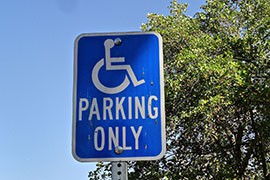Cronkite News has moved to a new home at cronkitenews.azpbs.org. Use this site to search archives from 2011 to May 2015. You can search the new site for current stories.
Gains, goals of Americans with Disabilities Act 25 years later
WASHINGTON – The iconic blue-and-white disability parking tags that appear to be proliferating in Arizona were the first and most recognizable effects of the Americans with Disabilities Act.
The ADA, 25 years old this July, has been pivotal in the fight to protect and empower people with disabilities. But advocates say there is still work to be done in the next 25 years.
“We have the law on the books – what’s the next step?” asked J.J. Rico, executive director of the Arizona Center for Disability Law.
For Rico, the goals are clear: Education that meets all students’ needs, inclusive employment settings and more accessible buildings.
Rico said special education is the No. 1 issue his center hears about and he expects it will remain so for years, as advocates work to ensure children with disabilities have access to education without being “restrained or secluded from their classmates.”
“School districts have obligations to educate all children,” which means children with and without disabilities, Rico said.
Education can help children “move into that employment world,” but the workplace can present its own hurdles for people with disabilities – beginning with the application.
Rico said a job posting might require the ability lift 50 pounds, even if that doesn’t apply to everyday duties. But a person with a disability may turn away, he said, “screening out people with disabilities” in the process.
If that person lands a job, the ADA requires the employer to make a “good-faith” effort to be sure that employee has what’s needed to perform the job. “That is a mandate – a legal mandate – that an employer reasonably accommodate an employee that has a disability,” Rico said, and it remains one of his centers’ biggest goals.
But the main thing Rico would like to see is a new portrayal of people with disabilities, focusing on individuals’ achievements and abilities and not just their disabilities.
Moving forward, he said, the “voice of the disability community” will focus on the “stories – not just the legal battles – but the stories of the outcomes and the achievements.”







